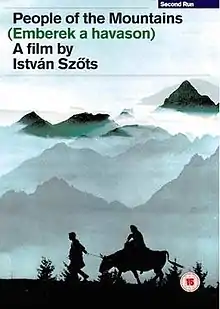People of the Mountains
People of the Mountains (Hungarian: Emberek a havason) is a 1942 Hungarian drama film directed by István Szőts and starring Alice Szellay, János Görbe, Péterke Ferency. The film is set in the Székely woodcutting community of Transylvania. The film's plot was based on a series of short stories by József Nyírő. The film was exhibited at the 1942 Venice Film Festival, where it was widely praised.[1] The film's style has been suggested as an influence on the emerging Italian neorealism.[2] It was not granted an exhibition certificate in Nazi Germany because Joseph Goebbels considered it "too Catholic".[3]
| People of the Mountains | |
|---|---|
 | |
| Directed by | István Szőts |
| Written by | József Nyírő (stories) István Szőts |
| Starring | Alice Szellay János Görbe Péterke Ferency József Bihari |
| Music by | Ferenc Farkas |
| Cinematography | Ferenc Fekete |
| Edited by | Zoltán Kerényi |
Production company | |
| Distributed by | Hunnia Filmgyár |
Release date | 1942 |
Running time | 88 minutes |
| Country | Hungary |
| Language | Hungarian |
Production
The film was shot on location in Transylvania which had been occupied by Hungarian troops following the Second Vienna Award during the Second World War while interior scenes were filmed at the Hunnia Film Studio in Budapest. The film was originally conceived as a short film, but studios bosses agreed to make it a feature film as long as costs could be kept low. Szőts had a relatively small film crew, and cast largely unknown actors in the leading roles.[4]
Cast
- Alice Szellay as Anna az asszony
- János Görbe as Erdei Csutak Gergely
- Péterke Ferency as Kicsi Gergö, their son
- József Bihari as Üdö Márton
- Lajos Gárday as Ülkei Ádám
- Oszkár Borovszky as Intéző / Steward
- Lenke Egyed as Szobaasszony / Landlady
- Imre Toronyi as Orvos / Doctor
- György Kürthy as Orvostanár / Medical professor
- János Pásztor as Favágó / Woodcutter
- Elemér Baló as Favágó / Woodcutter
- Jenö Danis as Favágó / Woodcutter
- Sándor Hidassy as Utas / Passenger
- János Makláry as Kalauz / Conductor[5]
References
- Cunningham p.53
- Cunningham p.56
- Cunningham p.57
- Cunningham p.53-54
- MaNDA's file : "Emberek a havason". Informations (in Hungarian). Magyar Nemzeti Digitális Archívum és Filmintézet (MaNDA). 2012. Archived from the original on 2016-04-18. Retrieved 2018-10-06.
Bibliography
- Cunningham, John. Hungarian Cinema: From Coffee House to Multiplex. Wallflower Press, 2004.